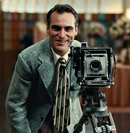In the last scene with both Lancaster Dodd (Philip Seymour Hoffman) and Freddie Quell (Joaquin Phoenix), Dodd tells Freddie to leave him forever, saying, "Go to that landless latitude, and good luck—for if you figure a way to live without serving a master, any master, then let the rest of us know, will you? For you'd be the first person in the history of the world."
Lancaster and Freddie are drawn to each other. Lancaster suggests a few times that he and Freddie are cosmically connected, that they knew each other in a previous life. Both Freddie Quell and Lancaster Dodd improvise in life.
But Lancaster feels the pressure of his followers' expectations, their fragile devotion, and his determined spouse, Peggy (Amy Adams).
Freddie represents something like freedom. He is wild. He gets out of control and does not try to control others. He seems to have no views. And he claims to do what he wants.
His relationship with Dodd is Freddie's only meaningful one since before the war when he courted a young girl. The relationship with Dodd gave Freddie a taste of intimacy.
But
Dodd cannot pursue life with Freddie. Freddie is too damaged, too unstable, too
uncontrollable, and Lancaster has too many commitments. Moreover, Peggy will
not allow it. So Lancaster will carry on without him, and Freddie will drift
away alone.
Notes:
- Peggy is an ominous, constant source of pressure. She immediately puts a stop to nudity at meetings of The Cause, and she pushes him away from Freddie.
- Freddie experiences intimacy when Doris (Madisen Beaty) sings to him. And he experiences intimacy again during the Lancaster-Freddie processing scene, among others. And early in the movie, we see Freddie pretending to have sex on the beach with a woman shaped from sand; the movie ends with a shot of Freddie lying still, almost sweetly, next to the sand woman on the beach.
- Now I am patting myself on the back for my 2013 post, "about the film "The Master," noting something that is beautifully expanded on in this piece in The New Yorker: “The Astonishing Power of ‘The Master’” by Richard Brody, September10, 2012.




